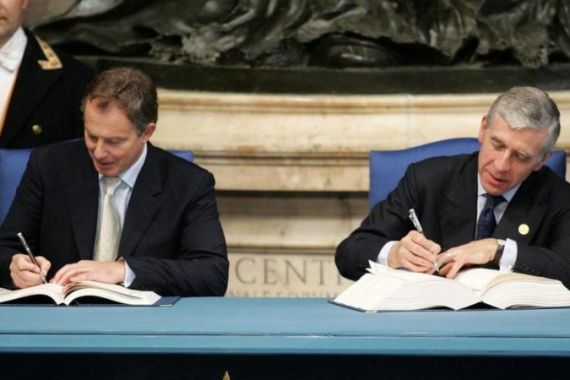UK wants Belhadj case in secret court
Government lawyers seek to keep lawsuit over secret Libya rendition of prominent Gaddafi opponent out of public domain.

The British government is trying to force a case examining its role in the rendering of an opponent of Muammar Gaddafi back to Libya in 2004 to be heard in a secret court, or not at all.
In the first preliminary hearing over the claim brought by Abdel Hakim Belhadj, a prominent rebel fighter-turned-politician, the government’s lawyers held on Tuesday that the case should either not go to trial in the UK, or that UK officials were “immune” from prosecution.
Jack Straw, former British foreign secretary, and Sir Mark Allen, a former senior MI6 officer, also stand accused by Belhadj for their role in the rendition.
“Obviously it’s very embarrassing for [the British officials], that they’ve been involved in torture and secret courts,” Donald Campbell, a spokesperson for the London-based human rights NGO Reprieve, told Al Jazeera.
Belhadj and Fatima Boudchar, his heavily pregnant wife, were captured in exile in China. The “rendering” operation was co-ordinated between the UK, US and Libyan intelligence agencies.
After being transferred back to Libya, Belhadj, who fought Gaddafi’s rule for decades, was held in Tripoli’s notorious Abu Salim prison, where he faced years of torture.
Belhadj has offered to settle the matter out of court if the British government agrees to pay a token amount of one British pound each, apologise and admit liability. The defendants have refused these terms.
His lawyers are also resisting efforts from the defendants’ legal team to have the case appear before the country’s newly-introduced “secret courts” in the name of “national security”.
Lucrative ties
Following the fall of the Gaddafi regime, documents from both the Britain’s MI6 and the US’s CIA were discovered in the office of Libya’s former spy chief, Moussa Koussa, detailing their co-operation on Belhadj’s rendition.
“The intelligence on [Mr Belhadj] was British,” and “this was the least we could do for you and for Libya to demonstrate the remarkable relationship we have built over the years,” Allen wrote in the documents.
Allen was head of the spy agency’s counterterrorism service until he quit to join the British Petroleum company. His close relations with the Libyan regime, particularly Saif al-Islam, were to prove lucrative.
The rendition of Belhadj and other enemies of the former Libyan leader also appeared to have paved the way for Tony Blair’s controversial 2007 ‘Deal in the Desert’, which forged security and military ties between the UK and Libya.
Belhadj was the leader of the Libyan Islamic Fighting Group, an armed group that opposed Gaddafi until it was largely crushed in 1998. He denied having any ties to al-Qaeda in a 2011 interview with Al Jazeera.
“Even the Western intelligence agencies have found no connection between the Libyan Islamic Fighting Group and al-Qaeda,” he said.
“The confusion stems from us being active at the same time and place as them. We never sympathised with them or supported their activities. We were against their ideas and actions.”
Belhadj came to prominence most recently as a rebel leader during the uprising in 2011, and is currently the leader of Al-Watan Party.
Fair hearing?
Britain is a signatory to the Convention Against Torture (CAT), an international agreement which bans torture and requires states to have an effective remedy for anyone who undergoes torture.
“Unsurprisingly, the government is trying to drag this out but they are simply delaying the inevitable,” Campbell said.
“Witnesses are still to be determined but we would want him to give evidence as the clients want, and are entitled, to hear what he has to say for himself and his part in their torture.”
Another key witness who is unlikely to be jumping at the chance to appear before any court, secret or public, is Libya’s former spy chief, Moussa Koussa.
Belhadj’s case exposes just how close Libyan and British intelligence were during the last years of Gaddafi’s rule, after relations warmed during the so-called War on Terror.
Indeed, it was in London that Koussa sought refuge after he defected, offering his services against the Gaddafi regime. Although British Prime Minister David Cameron said at the time Koussa may face charges, British authorities allowed him to travel abroad. Koussa was last reported to be living in Doha, Qatar.
Campbell said Belhadj is not pursuing legal actions against US authorities for their role in his rendition in the immediate future.